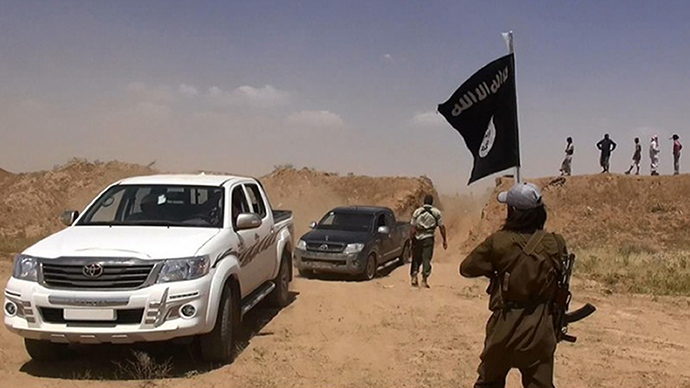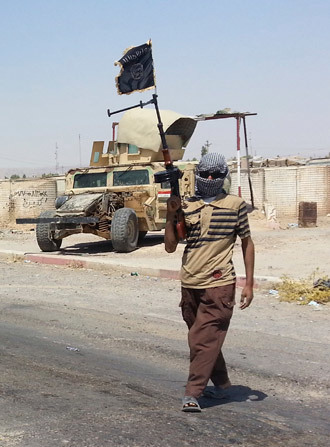Why ISIS violence in Iraq reminds of the Khmer Rouge tragedy

The arrival of the Islamic State of Iraq and al-Sham (ISIS) onto the global stage with its recent invasion of northern Iraq has induced panic not only in the region but throughout the world.
This panic has been particularly felt in Western capitals among political elites whose disastrous policies in the region have created the chaos, instability, and despair out of which these religious fanatics have emerged.
Crises such as the one that has engulfed the Middle East with the emergence of ISIS force us to confront the truth that those who fail to learn the lessons of history are doomed to repeat it. And, here, we cannot avoid comparisons and similarities between Syria and Iraq today and Cambodia in the 1970s, when in similar conditions of chaos and carnage, inflicted on the people of Cambodia as a result of the extension of the war in Vietnam by the United States with a mass bombing campaign that many consider to have been an act of genocide, led to its takeover by the Khmer Rouge.
In 1973 the US dropped more bombs on Cambodia in just a few weeks than it dropped on Japan in the Second World War. This small country across the Republic of Vietnam’s western border, with in 1973 a population of between 7-8 million people, found itself on the receiving end of the equivalent of five Hiroshimas. The number of people killed by the US bombing campaign has never been verified, but it’s thought to have been in the region of 500,000. It was a crime against humanity to rank with any since the Second World War.

The Khmer Rouge at the time was a marginal Maoist cult in Cambodia. Led by Pol Pot, a former Buddhist monk, they had no base of support and its influence was nonexistent. The mass bombing of the country, the destruction and chaos it wrought changed that. By 1975 the Khmer Rouge had managed to take over the country, whereupon they immediately embarked upon one of the most brutal and barbaric campaigns of genocidal violence the world has seen. With the objective of taking the country back to Year Zero, an agrarian pure communist society, they forcibly depopulated Cambodian cities and towns, sending people into the country to work on the land in communes. Thousands died from disease and starvation, others were worked to death, while thousands more were tortured and executed. Teachers, doctors, lawyers, people who’d been educated, Buddhist monks, non Cambodians, all were slaughtered in the Khmer Rouge’s campaign to purify the country of anything which did not conform to their twisted worldview, setting up a network of slave labor camps and torture centers throughout the country in which brutality knew no bounds. By the end of their reign a third of Cambodia’s population had perished. It was, in the famous words of Hannah Arendt vis-à-vis the Holocaust, the banality of evil.
The brutal rule of Pol Pot and the Khmer Rouge lasted until 1979, when after defeating the might of the US military forces and their collaborators, the armed forces of the Republic of Vietnam entered the country to liberate its people. The response of the West to the liberation of Cambodia was to impose economic sanctions on the country. This was an act of nauseating cruelty against a beleaguered people whose only crime was that they had been liberated by a country, Vietnam, that had refused to accept its colonial status and thrown off the yoke of Western domination.
Fast forward to 2014 and the parallels between Cambodia and the Middle East are obvious. The conditions, as mentioned, out of which ISIS have emerged and proliferated, were created by the West’s destabilizing presence in the region with the objective of securing its own geopolitical objectives. The war in Iraq in 2003 devastated the country and opened up its sectarian fissures, while the exploitation of the Arab Spring in 2011 to topple the Gaddafi regime led directly to the proliferation of religious extremism and that country’s descent into lawlessness and fragmentation. After Libya came Syria, where currently ISIS constitutes the dominant faction within an opposition that includes thousands of foreign extremists – people who hold to a similar barbaric and anti-human ideology that characterized the Khmer Rouge. They have no political program that can be negotiated with, nor anything to offer the region except an abyss of sectarian violence and bloodletting, which is why they must be defeated and destroyed.
Something that must be made clear is the disjuncture that exists between Islam and ISIS. As the Khmer Rouge’s brand of communism was rejected as a perversion by the vast majority of communists in the world, so the ideology of ISIS is rejected by the bulk of the world’s Sunni Muslims on the same grounds.
Unsurprisingly, the regression that has befallen the Middle East over the past decade has a discernible cause. It is the chaos and carnage visited on the region by Washington and its allies in the pursuit of regional hegemony; the very same that was visited on Southeast Asia in the 1960s and 1970s. The principle of cause and effect has never been more clearly demonstrated by those whose ignorance and mendacity shows little if any sign of abating anytime soon.
The statements, views and opinions expressed in this column are solely those of the author and do not necessarily represent those of RT.
The statements, views and opinions expressed in this column are solely those of the author and do not necessarily represent those of RT.













